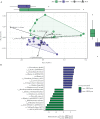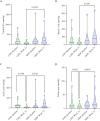A Mediterranean Diet Pattern Improves Intestinal Inflammation Concomitant with Reshaping of the Bacteriome in Ulcerative Colitis: A Randomised Controlled Trial
- PMID: 37095601
- PMCID: PMC10637046
- DOI: 10.1093/ecco-jcc/jjad073
A Mediterranean Diet Pattern Improves Intestinal Inflammation Concomitant with Reshaping of the Bacteriome in Ulcerative Colitis: A Randomised Controlled Trial
Abstract
Background and aims: Dietary patterns are important in managing ulcerative colitis [UC], given their influence on gut microbiome-host symbiosis and inflammation. We investigated whether the Mediterranean Diet Pattern [MDP] vs the Canadian Habitual Diet Pattern [CHD] would affect disease activity, inflammation, and the gut microbiome in patients with quiescent UC.
Methods: We performed a prospective, randomised, controlled trial in adults [65% female; median age 47 years] with quiescent UC in an outpatient setting from 2017 to 2021. Participants were randomised to an MDP [n = 15] or CHD [n = 13] for 12 weeks. Disease activity [Simple Clinical Colitis Activity Index] and faecal calprotectin [FC] were measured at baseline and week 12. Stool samples were analysed by 16S rRNA gene amplicon sequencing.
Results: The diet was well tolerated by the MDP group. At week 12, 75% [9/12] of participants in the CHD had an FC >100 μg/g, vs 20% [3/15] of participants in the MDP group. The MDP group had higher levels of total faecal short chain fatty acids [SCFAs] [p = 0.01], acetic acid [p = 0.03], and butyric acid [p = 0.03] compared with the CHD. Furthermore, the MDP induced alterations in microbial species associated with a protective role in colitis [Alistipes finegoldii and Flavonifractor plautii], as well as the production of SCFAs [Ruminococcus bromii].
Conclusions: An MDP induces gut microbiome alterations associated with the maintenance of clinical remission and reduced FC in patients with quiescent UC. The data support that the MDP is a sustainable diet pattern that could be recommended as a maintenance diet and adjunctive therapy for UC patients in clinical remission. ClinicalTrials.gov no: NCT0305371.
Keywords: Mediterranean diet; inflammation; microbiome; ulcerative colitis.
© The Author(s) 2023. Published by Oxford University Press on behalf of European Crohn’s and Colitis Organisation.
Conflict of interest statement
The authors declare no competing interests.
Figures






Comment in
-
Shifting the Inflammatory Balance in Ulcerative Colitis Through Diet: A Mediterranean Diet Pattern is Associated with Improvements in Dysbiosis and Disease Activity.J Crohns Colitis. 2023 Nov 8;17(10):1555-1556. doi: 10.1093/ecco-jcc/jjad095. J Crohns Colitis. 2023. PMID: 37350629 No abstract available.
References
-
- Magro F, Gionchetti P, Eliakim R, et al. Third European evidence-based consensus on diagnosis and management of ulcerative colitis. Part 1: Definitions, diagnosis, extra-intestinal manifestations, pregnancy, cancer surveillance, surgery, and ileo-anal pouch disorders. J Crohns Colitis 2017;11. doi: 10.1093/ecco-jcc/jjx008. - DOI - PubMed
Publication types
MeSH terms
Substances
Grants and funding
LinkOut - more resources
Full Text Sources
Medical

